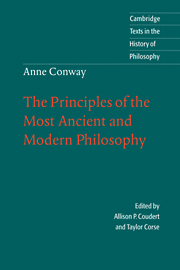Book contents
- Frontmatter
- Contents
- Acknowledgments
- Introduction
- Chronology
- Further reading
- Note on the text
- The Principles of the Most Ancient and Modern Philosophy
- Unpublished Preface by Henry More
- Published Preface
- Chapter I
- Chapter II
- Chapter III
- Chapter IV
- Chapter V
- Chapter VI
- Chapter VII
- Chapter VIII
- Chapter IX
- Index
- Cambridge Texts in the History of Philosophy
Chapter VIII
Published online by Cambridge University Press: 18 November 2009
- Frontmatter
- Contents
- Acknowledgments
- Introduction
- Chronology
- Further reading
- Note on the text
- The Principles of the Most Ancient and Modern Philosophy
- Unpublished Preface by Henry More
- Published Preface
- Chapter I
- Chapter II
- Chapter III
- Chapter IV
- Chapter V
- Chapter VI
- Chapter VII
- Chapter VIII
- Chapter IX
- Index
- Cambridge Texts in the History of Philosophy
Summary
S. 1. It is further proved by three additional proofs that spirit and body, insofar as they are creatures, do not essentially differ. And a fourth reason is taken from that intimate union or bond which exists between spirits and bodies. S. 2. If the way in which the soul moves the body is illustrated by the way that God moves creatures, this comparison is altogether false. S. 3. The union and sympathy of soul and body can be easily demonstrated, as can the way in which the soul moves the body, from the above mentioned principle that spirit is body and body spirit. S. 4. A fifth argument is taken from earth and water, which continually produce various kinds of animals from rotting and corrupt matter. S. 5. How gross matter is changed into spirit and becomes, as it were, the mother of spirits. An example is drawn from our corporeal nourishment, which through various transmutations in the body is changed into animal spirits and from these into more subtle and spiritual spirits. S. 6. Concerning the good and bad angels of men, which are properly human angels, and which proceed from him just like branches from roots. S. 7. The sixth and last argument is taken from some passages of Scripture.
S. 1. The fourth argument, to prove that spirit and body do not differ in essence but in degree, I take from that intimate union or bond which exists between spirits and bodies, by means of which spirits have dominion over bodies with which they are united, so that they move them from one place to another and use them as instruments in their various operations.
- Type
- Chapter
- Information
- Publisher: Cambridge University PressPrint publication year: 1996

